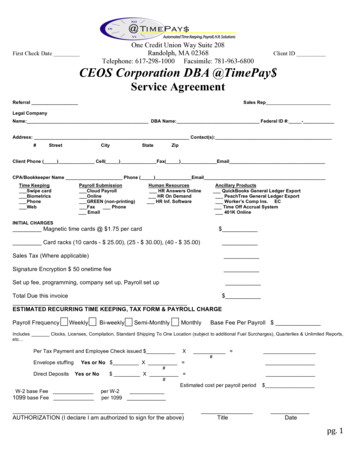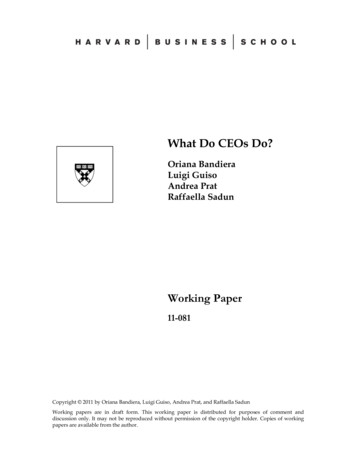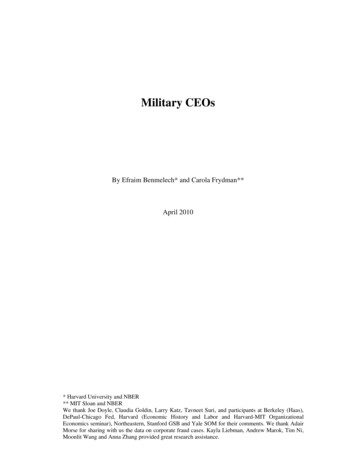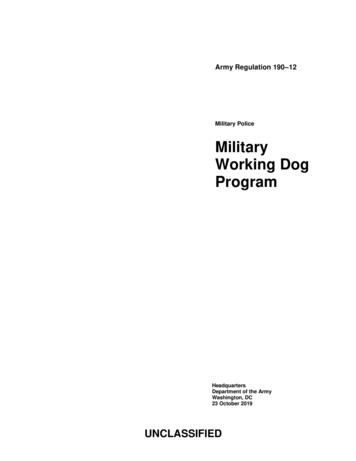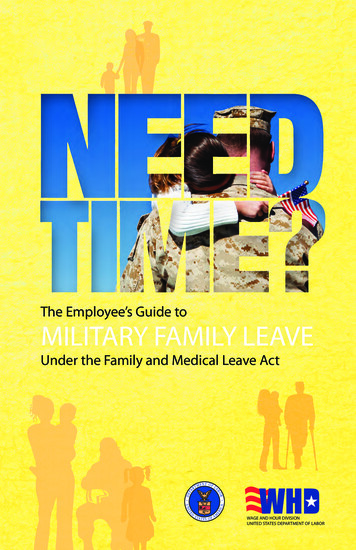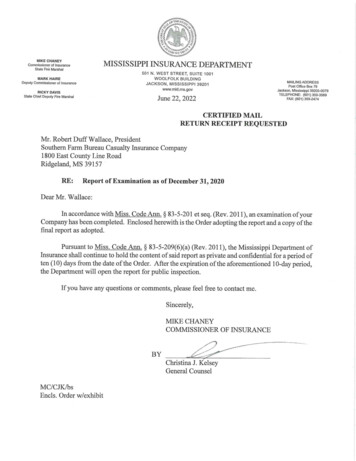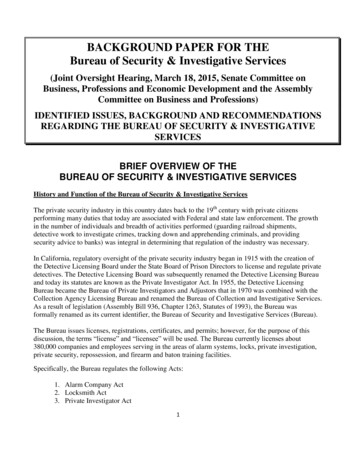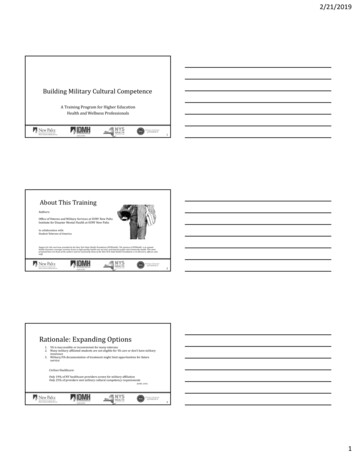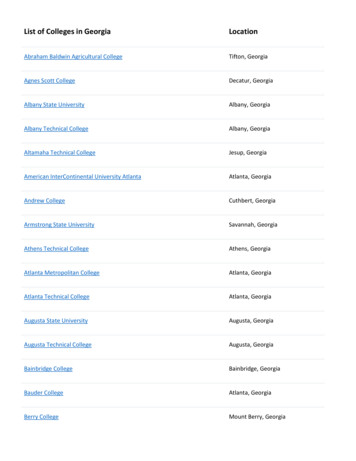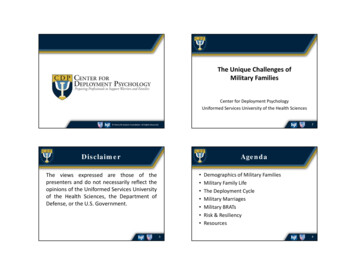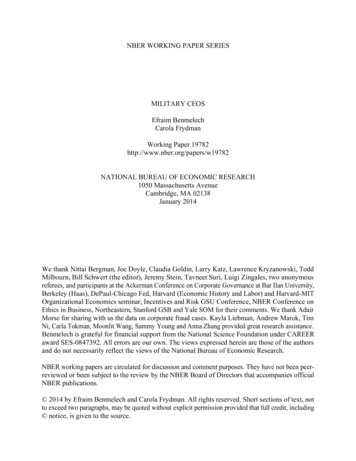
Transcription
NBER WORKING PAPER SERIESMILITARY CEOSEfraim BenmelechCarola FrydmanWorking Paper 19782http://www.nber.org/papers/w19782NATIONAL BUREAU OF ECONOMIC RESEARCH1050 Massachusetts AvenueCambridge, MA 02138January 2014We thank Nittai Bergman, Joe Doyle, Claudia Goldin, Larry Katz, Lawrence Kryzanowski, ToddMilbourn, Bill Schwert (the editor), Jeremy Stein, Tavneet Suri, Luigi Zingales, two anonymousreferees, and participants at the Ackerman Conference on Corporate Governance at Bar Ilan University,Berkeley (Haas), DePaul-Chicago Fed, Harvard (Economic History and Labor) and Harvard-MITOrganizational Economics seminar, Incentives and Risk GSU Conference, NBER Conference onEthics in Business, Northeastern, Stanford GSB and Yale SOM for their comments. We thank AdairMorse for sharing with us the data on corporate fraud cases. Kayla Liebman, Andrew Marok, TimNi, Carla Tokman, Moonlit Wang, Sammy Young and Anna Zhang provided great research assistance.Benmelech is grateful for financial support from the National Science Foundation under CAREERaward SES-0847392. All errors are our own. The views expressed herein are those of the authorsand do not necessarily reflect the views of the National Bureau of Economic Research.NBER working papers are circulated for discussion and comment purposes. They have not been peerreviewed or been subject to the review by the NBER Board of Directors that accompanies officialNBER publications. 2014 by Efraim Benmelech and Carola Frydman. All rights reserved. Short sections of text, notto exceed two paragraphs, may be quoted without explicit permission provided that full credit, including notice, is given to the source.
Military CEOsEfraim Benmelech and Carola FrydmanNBER Working Paper No. 19782January 2014JEL No. D23,G3,G31,G32ABSTRACTThere is mounting evidence of the influence of personal characteristics of CEOs on corporate outcomes.In this paper we analyze the relation between military service of CEOs and managerial decisions, financialpolicies, and corporate outcomes. Exploiting exogenous variation in the propensity to serve in themilitary, we show that military service is associated with conservative corporate policies and ethicalbehavior. Military CEOs pursue lower corporate investment, are less likely to be involved in corporatefraudulent activity, and perform better during industry downturns. Taken together, our results showthat military service has significant explanatory power for managerial decisions and firm outcomes.Efraim BenmelechKellogg School of ManagementNorthwestern University2001 Sheridan RoadEvanston, IL 60208and NBERe-benmelech@kellogg.northwestern.eduCarola FrydmanDepartment of EconomicsBoston University270 Bay State RoadBoston, MA 02215and NBERcfrydman@bu.edu
“I don’t know what I’d be doing [without the military], but I wouldn’t be here. A daydoesn’t go by that I don’t use the leadership lessons I learned in the Navy. It wasabsolutely vital.”—Anthony F. Early Jr., CEO, DTE Energy1. IntroductionCEOs with military backgrounds have been disappearing from corporate America. Thesupply of executives who have served in the military and, in particular, of those withcombat experience has diminished since World War II and Korea veterans have retired.Whereas in 1980, 59% of the CEOs of large, publicly held corporations had served in themilitary, today only 6.2% of CEOs of these firms have a military background (see Fig. 1).Instead, most current chief executives have been trained through business degrees andexecutive education programs.1 Companies such as Wal-Mart and General Electric,decrying a lack of leadership and dedication among young managers, have startedprograms to recruit junior military officers who served in Iraq and Afghanistan to solve ashortage of leadership talent (O’Keefe, 2010).Has the disappearance of executives who served in the military from the C-suitehad a real impact on corporate America? Service in the military may alter the behavior ofservicemen and women in various ways that could affect their actions when they becomeCEOs later in life. Militaries have organized, sequential training programs that combineeducation with on-the-job experience and are designed to develop command skills.Evidence from sociology and organizational behavior research suggests that individuals1The fraction of CEOs with a business degree has increased sharply over this period. In fact, only 16.1% ofCEOs in 1980 had an MBA degree. This percentage rose to 35.2% in 2006, and to about 40.0% by 2012.1
may acquire hands-on leadership experience through military service that is difficult tolearn otherwise and that they may be better at making decisions under pressure or in acrisis (Duffy, 2006). It is possible, therefore, that military CEOs may be more prepared tomake difficult decisions during periods of industry distress. Moreover, military serviceemphasizes duty, dedication, and self-sacrifice. The military may thus inculcate a valuesystem that encourages CEOs to make ethical decisions and to be more dedicated andloyal to the companies they run rather than pursue their own self-interest (Franke, 2001).On the other hand, a large literature in psychology finds that military service leadsto aggressiveness, overconfidence, and increased risk-taking.2 Thus, evidence from otherdisciplines does not provide clear-cut predictions on how service in the military affectsindividual decision-making later in life.We find that firms run by military CEOs invest less, have lower expenditures onresearch and development (R&D), and pursue slightly lower leverage ratios than theirnonmilitary peers. We do not find effects on other variables intended to captureinvestment and financial policies, such as acquisitions and dividend payments. Ourfindings, therefore, are suggestive but not conclusive of an association between militaryCEOs and more conservative investment and financial policies.While the psychology and organizational behavior literature does not provideclear guidance for the effects of military background on the aforementioned policies, itdoes suggest that the military may instill a stronger sense of ethics. Consistent with thefindings in this literature, we find that CEOs with military experience are significantlyless likely to be involved in corporate fraudulent activity compared to CEOs who have2See, e.g., Elder (1986), Elder and Clipp (1989), and Elder, Gimbel, and Ivie (1991).2
not served in the military. Our estimates indicate that military service is associated with a70% reduction in the likelihood of fraud compared to the unconditional mean. When werun a horse race between the effect of an MBA education and military experience onfraud, we find again that military experience—but not business education—is associatedwith fewer incidents of alleged financial fraud.We also consider the effect of military background on CEO performance underpressure. We find that CEOs with a military background tend to perform better duringperiods of industry distress, as evident by higher market-to-book ratio. Thus, themanagement style of CEOs who served in the military seems to be more resilient to crisisand fraud in ways that do not seem to be provided to the same extent by academicprograms in business schools.Although we would like to interpret our findings as evidence for a direct effect ofservice in the military on executive decisions, our results could reflect unobservedpersonal characteristics correlated with both military service and corporate policies.Moreover, our estimates may be biased downward due to measurement error indetermining military service. To alleviate some of these concerns, we use an instrumentalvariables (IV) strategy. We exploit the fact that demand for manpower during wartimeexogenously increases the likelihood of service among certain cohorts. Results fromapproaches using variation in year of birth for the entire sample or from discrete changesin the likelihood of being drafted during the Korean War are consistent with most of ourordinary least squares (OLS) findings: we document negative correlations betweenmilitary service and investment and R&D expenditures, as well as a positive correlationbetween military service and performance in times of industry distress.3
It is important to note that military experience may relate firm outcomes throughtwo possible channels. First, firms with a need either to reduce investment and R&Dexpenditures or to minimize the incidence of corporate fraud may choose to hire a CEOwith military experience for this purpose. Alternatively, military background may not bepart of the selection criteria in choosing a CEO. Under this scenario, the imprinting ofmilitary service exogenously affects executive decisions and is therefore reflected incorporate policies. These two interpretations are consistent with an effect of militaryexperience on firm outcomes, whether by a matching mechanism or through randomassignments.The instrumental variables approach suggests that the sorting of future CEOs intomilitary service due to unobserved innate characteristics does not drive our findings, butit cannot address a concern about the selection of military CEOs into particular firms. Wecontrol for industry fixed effects in all of our specifications, so our results are unlikely tobe driven by specific trends in industries that disproportionately hire military CEOs.However, the low incidence of changes in the military type of the chief executives withinfirms does not allow us to control for firm fixed effects. We thus cannot rule out that ourestimates reflect the sorting of military CEOs into firms with more conservativeinvestment and financial policies, as well as lower incidence of fraud, within industries.We therefore urge caution when interpreting our results, which suggest that there is anassociation (but not necessarily a causal relation) between military experience and avariety of firm outcomes.Our paper is related to a growing literature in corporate finance emphasizing theimportance of the person in charge of an organization for a firm’s decisions and4
performance (Graham and Narasimhan, 2004; Malmendier and Tate, 2005; PérezGonzález, 2006; Bennedsen, Nielsen, Pérez-González, and Wolfenzon, 2007; Bennedsen,Pérez-González, and Wolfenzon, 2008; Schoar and Zuo, 2011; Kaplan, Klebanov, andSorensen, 2012). Likewise, Bertrand and Schoar (2003) show that top executives haveperson-specific managerial styles that contribute to differences in performance, financial,investment, and other organizational policies across firms. Understanding whichexperiences and individual traits shape these managerial fixed effects remains an openquestion. This paper explores the possibility that CEOs’ life experiences help shape thetype of manager they will become and the type of firms they will lead by focusing onwhether chief executives with a military background behave differently than theirnonmilitary peers. Our paper is therefore complementary to Malmendier, Tate, and Yan(2011), who find that having lived through the Great Depression or served on the militaryaffects CEOs’ financial decisions.More broadly, our paper adds to the literature that emphasizes the role that cultureplays in economic activity (Guiso, Sapienza, and Zingales, 2006, 2008; Tabellini, 2008),and in particular to the role that culture and ethics play in the theory of the firm (Kreps1990; Erhard, Jensen, and Zaffron, 2007) and in corporate governance and valuations(Edmans, 2011; Guiso, Sapienza, and Zingales, 2013).The remainder of the paper is organized as follows. Section 2 presents a summaryof the multidisciplinary research that looks into the effects of military service onpostmilitary behavior, values, and leadership. Section 3 presents the data and summarystatistics. We discuss the empirical relation between military experience and firm5
outcomes in Section 4 and address endogeneity and selection concerns in Section 5. Weconclude in Section 6.2. Military service leadership and ethicsThere is a large literature that investigates the effect of military service on leadership.3According the US Army’s official vision statement, the army is “about leadership; it isour stock in trade, and it is what makes us different” (US Army, 1999a, p. 7). Indeed, asWong, Bliese, and McGurk (2003) discuss, leadership and military are practicallyinseparable, and the names of such military notables as George S. Patton, Dwight D.Eisenhower, and Robert E. Lee have become synonymous with leadership.Whether leadership and, in particular, former military leaders play an importantrole in the performance of organizations is debated by academics. Organizationaltheorists, for example, question the role of individual leadership in the performance oforganizations (Pfeffer, 1977) and caution about the romance of leadership (Meindl andEhrlich, 1987). In contrast, some economists argue that leaders do matter (Jones andOlken, 2005).The literature in psychology that examines the effect of military service onpostmilitary behavior finds that service in the military is associated with overconfidence,aggressiveness, and risk-taking (Elder, 1986; Elder and Clipp, 1989; and Elder, Gimbel,and Ivie, 1991). For example, Wansink, Payne, and van Ittersum (2008) conduct a surveyof 526 World War II combat veterans and find that leadership, loyalty, and risk-taking arethree main characteristics of combat-decorated heroism. They write: “Perhaps the most3See Wong, Bliese, and McGurk (2003) for a review of military leadership.6
common characteristic anecdotally associated with acts of heroism is that of taking arisk” (p. 549).In addition, some business experts as well as organizational scholar andsociologists argue that military service builds unique and valuable leadership skills. Forexample, according to Duffy (2006):Military offers an early opportunity to acquire hands-on leadershipexperience that cannot be found in the corporate world or at similarlyearly stage in people’s careers. . . . Some of the most powerful [lessons inleadership] were learning how to work as part of a team; organizationalskills, such as planning and effective use of resources; goodcommunication skills; defining a goal and motivating others to follow it; ahighly developed sense of ethics; and calmness under pressure. (p. 3)The notion that service in the military is associated with a value system that promotesintegrity and ethical behavior has found some support in academic research. For example,Franke (2001) compares the value orientation and attitudes of cadets in the United StatesMilitary Academy (USMA) at West Point to those of civilian undergraduate students.While the evidence is far from being conclusive, he finds that being a cadet at the USMAis associated with conservatism and patriotism. Also, when presented with the statement,“Honesty is the best policy in all cases,” 81% of the cadets agree, compared to 68% ofthe civilian undergraduate students. Similarly, more cadets than civilian students agreethat “one should take action only when one is sure that it is morally right” (64% vs.7
51%). Finally, 23% of the cadets believe that “it is hard to get ahead without cuttingcorners here and there,” compared to 53% of the undergraduate students who agree withthis statement. However, these results do not necessarily point to a causal effect ofservice in the military on value orientation since they are subject to a selection concern inwhich individuals with a particular value system may self-select to serve in the military.Military experience may also help executives handle pressure and make decisionsunder stress. In his book on corporate turnarounds, Shein (2011) argues that “situationslike this, though somewhat extreme, illustrate the first rule of leadership in a corporatecrisis: leaders absolutely must display courage” (p. 59). He writes:I have found that employees often respond best to these communications whenthey include military or medical metaphors. The concepts of war or medicineseem to connote the urgency of the company’s situation and the “win-at-allcosts” nature of the necessary response. In turnarounds, managers . . . talk ofbeing “in the trenches” or needing to “take the hill.” It may seem overly simple,but these metaphors resonate immediately with employees, who find themselves ina highly emotional situation with uncertainty and fear swirling around them. Theywant someone to lead. (pp. 68–69)Our summary of the literature reveals that there is no one “big unified theory” of militaryleadership. Anecdotal evidence, as well as academic research in psychology, sociologyand organizational behavior, suggests that people who serve in the military tend to beaggressive and overconfident, as well as ethical and loyal. We use these suggestive8
findings and anecdotes to motivate our empirical examination of the association betweenmilitary service and corporate and financial outcomes.3. Data and summary statisticsTo determine whether military experience affects CEO performance, we construct amanager-firm matched panel dataset. We start with data from the Forbes 800 surveys for1980 to 1991 and use Execucomp from 1992 to 2006. The Forbes survey identifies thenames of the chief executives of the 800 largest US firms. From Execucomp we obtainthe names of the CEOs of about 1,500 publicly traded US firms in each year.4To obtain information on the personal characteristics and the military backgroundof the executives, we first search for biographical information in “Who’s Who in Industryand Commerce.”5 Because “Who’s Who” explicitly asks for information on militaryservice, using this resource as our primary source of data minimizes measurement error inour main variable of interest. However, many executives do not appear in “Who’s Who”or, if listed, have sparse information. To complement this source, we also use the moredescriptive biographies from the Gale Research Group, as well as such other sources ascompanies’ proxy statements and corporate web pages.6 For each executive we collectinformation on the date and place of birth, the educational background, and militaryservice. We restrict our analysis to those CEOs for which we observe their year of birth.4Until 1994, the information in Execucomp is limited mostly to the S&P 500; thus, our sample size issignificantly smaller in 1992 and 1993. Starting in 1994, the database expands to include the S&P 1,500.Execucomp provides information on at least the five highest-paid executives in each firm. We limit thesample to CEOs for comparability with the Forbes data and because the likelihood of finding biographicalinformation for non-CEOs is significantly lower.5We initially accessed “Who’s Who” through the Biography Resource Center from the Gale ResearchGroup. This source is now available through LexisNexis Academic.6Proxy statements and corporate web pages are less likely to report information on military service. Thesesources allow us to increase the sample size because they often provide information on year of birth whenthese data are not reported in “Who’s Who.”9
Fig. 1 shows that the fraction of CEOs who served in the military has experienceda steady decline from a level of 59% in 1980 to merely 6.2% in 2006. In each year in thesample, the share of veterans diminished by 1 to 5 percentage points. The small increasein military CEOs between 1991 and 1992 depicted in the figure is an artificial blip due toa reduction in the sample size when we switch from Forbes to Execucomp data.7 As wediscuss below, controlling for birth cohort is central to our analysis, in order to avoidconfounding effects that could be attributed to both military service and age. We findbiographies reporting the year of birth for a total of 4,190 CEOs (about 62% of theexecutives we search), and we restrict our data to the executives born from 1913 to1960.8 The resulting sample contains a total of 4,013 managers, 2,402 firms, and 22,044manager-year observations.9 When we exclude financial and insurance companies in ourinvestment regressions, the number of firms is reduced to 1,508. For each firm-year, weobtain accounting data from Compustat, and we restrict the sample to firms with nonmissing values of total assets.Panel A of Table 1 presents the summary statistics for the executive’s personalcharacteristics by military background. Executives from earlier cohorts are more likely toserve in the military, reflecting the secular decline in military enrollment among thegeneral population and especially among highly educated individuals. Moreover, all7Execucomp covers only S&P 500 firms in 1992. As a result, the number of CEOs in the sample declinesfrom 603 in 1991 to 359 in 1992, and then increases to 888 in 1993. Thus, our sample is more skewedtoward larger firms in 1992 than in other years, leading to an increase in the share of veterans. When wecontrol for firm size, we do not find that the small increase in military CEOs in 1992 relative to the levelsin 1991 or 1993 is statistically significant. Moreover, we do not find any significant differences in thepersonal characteristics (including details of their military service, education, and place of birth) of thechief executives in 1991 and 1992.8For the birth cohorts 1913–1960, we observe at least 30 individual executives in each year of birth.9The matching of Forbes firms to Compustat is not trivial because the firm identifiers are not consistentacross samples and because some of the firms in the Forbes surveys are not in Compustat. Thus, we lose anadditional 295 executives in the matching process.10
executives are highly educated, although CEOs without military experience appear tohave studied a year longer than executives with a military background (18.9 yearscompared to 17.9 years, respectively). It is important to note, however, that our data onthe completed years of education are subject to some measurement error, as they arebased on the reported year of graduation for different degrees, whereas we do not observewhether individuals have worked in the years between pursuing different academicdegrees.10To compare the educational background of executives, we collect information onthe institution they attended, the type of degree obtained, the field of study, and the yearof graduation for each educational degree we observe in the biographical sources. Wefind that military executives are more likely than nonmilitary managers to have attendedan Ivy League institution for at least one of their degrees; 33.3% of military executiveshave attended Ivy League institutions compared to 27.4% of the nonmilitary executives.We define an executive as having financial education if, for example, theindividual obtained an MBA or has a degree in accounting or economics. Similarly, wedefine the CEO as having a technical education if the field of study was, for example,engineering or physics or if the individual obtained a bachelor’s or a master’s degree in afield such as science.11 Using these broad definitions of educational backgrounds, we findthat more than a third of the executives have financial education and almost half have adegree in a technical discipline. CEOs with military service are less likely to have afinancial education, but there are no differences in the likelihood of having a technical10The years of education for executives with military experience are adjusted by the number of years ofmilitary service when the military service was conducted between periods of academic study.11The classification of educational background is not unique in the sense that an executive can have bothtechnical and financial background.11
education across military types. Perhaps not surprisingly, we find that military executivesare significantly more likely (27.9% versus 22.1%) to have been born in southern states.12Military executives are less likely to be foreigners: foreigners account for 9.4% ofnonmilitary CEOs, but only 3.2% of military CEOs are foreign-born.Finally, only a handful of the executives in our sample with military experiencehad a long-run career in the military. On average, managers spent fewer than four yearsin the military. In fact, only 1.6% of the executives for whom we observe the length ofmilitary service stayed in the military for ten or more years. The fact that the CEOs in oursample do not have an extensive career in the military is validated by their service ranks.Most of the military CEOs in our sample for whom we have information on highest rankachieved were officers (see Table 2). However, about 90% were lower-ranking officers.Indeed, less than 5% of the executives in the sample have a rank of major or higher.Thus, the effects documented in the paper are unlikely to be driven by career officers whoare hired in corporate positions later in life because of their long career in the military,their high rank, and their professional connections.Comparing the sample means for firms run by military and nonmilitary types, wefind important differences in the characteristics of firms (Panel B of Table 1). Individualswith no military experience tend to work in firms that are smaller (measured by totalassets), are marginally more profitable (measured by return on assets), have a higherTobin’s Q (measured as the market-to-book ratio), have higher expenditures on R&D(relative to lagged assets), and are more likely to be involved in acquisitions (measured12More than 40% of all new personnel enlisted or commissioned in 2002 came from the South, whereabout 36% percent of the total US population ages 18 to 24 lives. In 2002 southerners were overrepresentedamong new recruits in all services, ranging from 39% in the Marines to 42% in the Air Force (Segal andWechsler-Segal, 2004).12
by the value of acquisitions as a fraction of lagged assets).13 In contrast, firms that are runby executives with military background have higher book and market values of leverage,pay out more dividends (relative to their lagged assets), and invest more (measured bycapital expenditures as a fraction of lagged assets).Using Dyck, Morse, and Zingales’s (2010) sample of firms against which asecurities class action lawsuit was filed under the provisions of the Federal 1933–1934Exchange Acts, we match our data to a sample of corporate fraud cases. Interestingly, asTable 1 shows, military CEOs are significantly less likely to engage in fraudulentactivities.However, while the differences that emerge from the univariate analysis aresuggestive, they may be driven by time trends, firm characteristics, and other factors thatmay correlate with military background and selection of military CEOs into firms thatrequire their skills. Therefore, in the next section, we investigate the relation betweenmilitary experience and corporate outcomes in a multivariate regression setup. We useinstrumental variables to obtain exogenous variation in the propensity to serve in themilitary in these regressions in order to address the concern that an omitted characteristic,such as conservatism or having a sense of ethics, may lead individuals to enroll in themilitary and affect the decisions that they make as CEOs. Yet a remaining concern is thatunobserved firm characteristics may drive the results. Although we would like to includefirm fixed effects in the multivariate OLS and IV regressions to address this concern, weare unable to do so owing to a low number of firms that actually switch between CEOswith and without a military background.13To correct for the large outliers in Tobin’s Q, we follow the procedure of Baker, Stein, and Wurgler(2003) and force Q to take a value between zero and ten.13
4. Military CEOs and firm outcomes4.1. Effects of military service on firm performance, investment policy, and financialpolicyFollowing the literature on CEO styles, we begin our analysis by running panel OLSregressions that relate military experience to a variety of corporate outcomes. We focuson three main types of outcomes: investment decisions (for which we look at investment,R&D expenditure, and acquisitions), financial policies (for which we analyze book andmarket measures of leverage, and dividends payout), and overall firm performance(measured by Tobin’s Q and profitability). Specifically, we estimate the following model:yi,t α Military j β Characteristics j,t δ Xi,t ν t υ sic εi,t ,(1)in which y i.t is either a corporate decision or one of our two measures of firm’sperformance and X i,t is a vector of firm-level controls that includes, depending on the specification, Q, cash flow, firm size, asset tangibility, profitability, and leverage. In some specificationswe also control for a vector of executive characteristicsCharacteristics j that includes the executive’s age, whether the individual was born in asouthern state or a foreign country, and characteristics of the CEO’s educational background. All the regressions include three-digit SIC industry fixed effects υ sic as wellas year fixed effects ν t to control for differences across industries as well as time trendsin the outcome variables. We cluster the standard errors at the firm level.14 Thecoefficient of interest in our regressions is α , which relates military service to corporatedecisions and firm performance.14 Standard errors are marginally smaller if we cluster by executive instead.14
Table 3 displays the results from estimating regression (1) for each of thedependent variables using different specifications. An important concern in estimatingthe effect of military service on firm outcomes is that any correlation may be driven byomitted CEO characteristics. CEO age is of particular importance. The summary statisticsin Table 1, as well as Fig. 1, show that military experience is significantly higher inearlier cohorts. Other studies document that CEO age may be associated with risk-takingbehavior and managerial style (Bertrand and Schoar, 2003). To separat
Ethics in Business, Northeastern, Stanford GSB and Yale SOM for their comments. . executive education programs.1 Companies such as Wal-Mart and General Electric, decrying a lack of leadership and dedication among young managers, have started . CEOs in 1980 had an MBA degree. This percentage rose to 35.2% in 2006, and to about 40.0% by 2012. .
